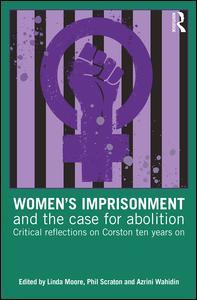Women’s Imprisonment and the Case for Abolition Critical Reflections on Corston Ten Years On
Coordonnateurs : Moore Linda, Scraton Phil, Wahidin Azrini

In 2007, the Corston Report recommended a far-reaching, radical, ?women-centred? approach to women?s imprisonment in England and Wales. It suggested a ?fundamental re-thinking? about how services to support women in conflict with the law are delivered in custody and in the community, recommending the development and implementation of a decarceration strategy. This argued for appropriate treatment programmes in the community, reserving prison for only those women who commit serious and violent offences. Ten years on, what progress has been made? What is the relationship between Corston?s vision and a more radical abolitionist agenda?
Drawing on a range of international scholarship, this book contributes to the critical discourse on the penal system, human rights, and social injustice, revealing the consequences of imprisonment on the lives of women and their families. A decade on from Corston's publication, it critically reviews her report, revealing the slow progress in meeting the reforms it proposed. Identifying the significant barriers to change, it questions the failure to reverse the unrelenting growth of the women?s prison population or to transform state responses to women?s offending. Reflecting the global expansion of women?s imprisonment, particularly marked in advanced democratic societies, the chapters include comparative contributions from jurisdictions where Corston?s recommendations have relevance. It concludes with a critical appraisal of reformism and the case for penal abolition.
Essential for applied and theory courses on prisons, punishment, and penology; social justice and the criminology of human rights; gender and crime; and feminist criminology.
Introduction, Linda Moore, Phil Scraton and Azrini Wahidin, 1. The Post-Corston Women’s Penal ‘Crisis’ in England and Wales: exploring the failure of reform, Linda Moore and Azrini Wahidin, 2. After Corston: Community, Change, and Challenges, Loraine Gelsthorpe, 3. From 'troubled' women, to failing institutions: The necessary narrative shift for the decarceration of women post-Corston, Becky Clarke and Kathryn Chadwick, 4. The Imprisonment of Women in Scotland: Restructure, Reform or Abolish? Margaret Malloch, 5. Post-Corston Reflections on Remanded Women’s Experiences in Northern Ireland, Gillian McNaull, 6. Corston Principles in Canada: Creating the Carceral Other and Moving Beyond Women in Prison, Vicki Chartrand and Jennifer M. Kilty, 7. In Pursuit of Fundamental Change within the Australian Penal Landscape: Taking Inspiration from the Corston Report, Julie Stubbs and Eileen Baldry, 8. ‘Ukhohliwe’: A South African Perspective on the Corston Report, Lillian Artz, 9. Beyond Corston: The Politics of Decarceration and Abolition in a Punitive Climate, Phil Scraton and Bree Carlton
Linda Moore is Senior Lecturer in Criminology in the School of Applied Social and Policy Sciences at Ulster University, UK.
Phil Scraton is Professor of Criminology in the School of Law, Queens University of Belfast, UK.
Azrini Wahidin is Professor of Criminology and Criminology Justice and Associate Dean for Research and Innovation in the School of Social Sciences, Humanities and Law, Teesside University, UK.
Date de parution : 11-2017
15.6x23.4 cm
Date de parution : 11-2017
15.6x23.4 cm
Disponible chez l'éditeur (délai d'approvisionnement : 14 jours).
Prix indicatif 160,25 €
Ajouter au panierThèmes de Women’s Imprisonment and the Case for Abolition :
Mots-clés :
BME Woman; Abolitionism; Corston Report; Penal Abolition; Community Rehabilitation Companies; Penology; Corston’s Recommendations; Feminist Criminology; Women’s Imprisonment; Corrections; Foreign National Women; Punishment and Society; Corston Review; Criminology of Human Rights; Women’s Prisons; Phil Scraton; Gender Specific Reform; Azrini Wahidin; Women’s Prison Population; Loraine Gelsthorpe; Custodial Remand; Becky Clarke; Canadian Federal Prisons; Kathryn Chadwick; Women Offenders; Margaret Malloch; Eileen Baldry; Gillian McNaull; Carceral Logics; Vicki Chartrand; Prison Reform Trust; Jennifer M; Kilty; Self-harming Women; Julie Stubbs; Gender Equality Duty; NSW Woman; Lillian Artz; Young Men; Bree Carlton; South African Prisons; Hydebank Wood; South African Prison System; Women’s Social Disadvantage; Corrective Service NSW



